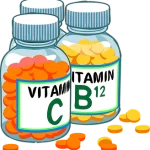If you’re in your late 50s or mid-60s, you’ve probably noticed your body doesn’t work quite like it used to anymore. Aging takes a big toll on your emotions, your joints, digestion, and sleeping schedule; it affects everything your body does to keep you healthy.
This means you have to put more effort into maintaining a healthy lifestyle. It’s not enough to be active and eat well anymore. You also have to start taking vitamins and schedule regular doctors appointments throughout the year.
Vitamins are pretty easy to work into your routine. Most seniors take some at in the morning and some at night. They barely have to think about doing this once they get into the habit of taking their vitamins every day.
Here are 7 of the best vitamins for seniors that you should be taking.
Table of Contents
1. Calcium
Did your parents ever stress the importance of drinking milk when you were little? Did you pass this habit on when raising your children and grandchildren?
Hopefully, you did! Milk is an excellent source of calcium, which your body needs to grow strong and healthy when you’re young and maintain its strength as you age.
Without calcium, the bones become fragile and more susceptible to injury. It may be harder to go about your daily life because you feel weak or a sense of pain in your joints.
But, taking calcium every day can relieve these things. It maintains your strength and helps reduce your risk of injury if you experience a slip and fall.
2. Vitamin D
Up next on the list is Vitamin D. When you’re young, the skin is able to produce Vitamin D when it has exposure to the sun. This does continue as you age, but the rate of Vitamin D production is not nearly enough as it should be.
Taking Vitamin D supplements ensures you’re getting enough of this nutrient. Vitamin D actually helps the body absorb calcium, and it can also help prevent your risk of osteoporosis, arthritis, and some immune diseases. It may even increase your likelihood of not getting certain types of cancer.
3. Potassium
You’ve probably changed a few of your eating habits during your aging process. Many senior citizens make an attempt to cut back on salty, greasy foods and on sugar in an attempt to maintain healthy blood pressure.
Still, your chances of being diagnosed with diabetes or high blood pressure increase as you get older. But, there are certain vitamins you can take to help offset these risks – like potassium.
Potassium helps regulate your blood flow. It also keeps your bone strong and it reduces your risk of getting kidney stones. You can increase your potassium intake by eating bananas or potatoes, or you can just start taking a potassium supplement every day. If you’re not sure which choice is best, talk to your regular doctor or home care professional.
4. Magnesium
Magnesium is another vitamin you should start taking.
This vitamin is essential to muscle contraction and relaxation, heart health, bone strength, and your metabolism. It plays a big role in many of your body’s most basic functions.
Plus, this vitamin also helps regulate many of the other supplements on this list! Taking magnesium ensures you don’t have too much of a certain vitamin flowing through your bloodstream. This reduces your risk of health concerns as you age.
5. B12
Some vitamins have a bigger effect on the mind than on the way the body feels physically. Such is the case with B12. This vitamin supports healthy cognitive functions as you age.
It plays into basic memory functions, regulating your emotions, and how mentally focused you feel throughout the day. Even if you feel like your mind is as sharp as ever, you should still consider taking this vitamin. A deficiency in B12 can increase your risk of depression and other forms of mental impairment.
Aging is already pretty challenging and there’s no sense in making it harder on your mind and body. Try using B12 for a month or so and see how your thoughts and emotions change.
6. Omega 3 Fatty Acids
If there’s a history of Alzheimer’s in your family, you definitely need to be taking omega 3 fatty acids. This vitamin can be found naturally in fish, but it’s much easier to maintain the proper levels of omega 3 by taking a supplement of it.
In addition to the reduced risk of Alzheimer’s, this vitamin contributes to maintaining better vision, reducing arthritis symptoms, and supporting bone health. This vitamin keeps your brain sharp and your body feeling well; it’s a no-brainer to add to your collection of daily supplements.
7. Fiber
Last but not least, fiber.
Fiber is mostly known for its digestion benefits, but it can offer a few more benefits worth taking advantage of. Fiber can reduce your chances of having high cholesterol and it prevents diabetes, too. It helps regulate your weight, reduces inflammation (primarily in your mid-section), and protects the joints.
It also creates healthy gut bacteria. This contributes to the way you pass food through your body, but more importantly, how you absorb all the vitamins and minerals on this list!
The Best Vitamins for Seniors, Babies, and Everyone in Between
As important as it is for seniors to take vitamins, the truth is everyone should be taking them! The best vitamins for you change as you age, but there’s no doubt that taking such supplements can keep you strong and healthy in all stages of life.
It’s not like you can go back in time and start taking vitamins in your 30s or 40s. But, you can make the effort now to pay more attention to what you’re putting into your body, and to educate your family about the vitamins that can benefit them.
To learn more about the power of taking vitamins, click here.







